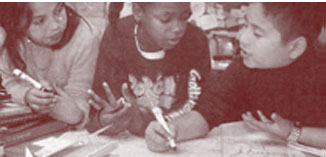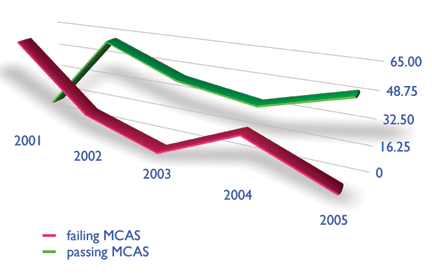



Focus on Results
Learning Prep School
“Thinking Maps give me a chance to learn”
Learning Prep Student
“I couldn’t get it when one of my old teachers talked to me all day and then wanted me to write a lot of words. At this new school, I can understand the teachers when they use the maps. And I can finally do the work because I get it!”
See the student video interview below.
Learning Prep Overview
Learning Prep School is an innovative educational and therapeutic milieu for students with language and learning disabilities. Understanding that language skills are the basis for all learning, LPS's unique curriculum integrates the teaching of language skills in all subjects. Serving students from communities throughout New England, LPS is the only school specifically designed for language-impaired students within the region.
For more information, go to the Learning Prep School website at www.learningprep.org
Thinking Maps at Learning Prep Overview
“Thinking Maps is one of the most powerful tools that Learning Prep School uses to facilitate learning for students who have been unable to succeed in other educational environments. We now see the significant results of our students’ performance through the use of these visual tools as integrated into our overall program. The MCAS is the Massachusetts Comprehensive Assessment System test for school assessment and accountability in the state of Massachusetts.”
Cynthia Manning, M. Ed., Learning Prep School, Newton, Massachusetts
Go to the Learning Prep Programs webpage
Go to the Thinking Maps webpage
Improving Reading Compehension Through Visual Tools
Masters Degree Thesis by Cynthia Manning
Eastern Nazarene Graduate School, 2003
Summary: Reading comprehension in learning disabled students can be increased with the classroom implementation of visual tools. Student performance was measured using MCAS reading scores before and after the introduction of Thinking Maps, i.e., a set of visual tools which are centered on the development of eight thinking processes. By integrating this common visual language throughout the school's curriculum, it was projected that more effective and efficient learning would be achieved. Assessment results indicated that reading comprehension was increased; it was also observed by classroom teachers that levels of performance rose overall in the following areas: concept attainment, reflective thinking, recall, retention, writing (quantity and quality), creativity, motivation, and cooperative learning skills. These findings are congruent with a multitude of research studies and support the position that student performance can be increased with the implementation of visual tools.
![]() Download the Master's Thesis summary Improving Reading Compehension Through Visual Tools (Acrobat PDF file)
Download the Master's Thesis summary Improving Reading Compehension Through Visual Tools (Acrobat PDF file)
![]() Download the Master's Thesis Improving Reading Compehension Through Visual Tools including student examples (Acrobat PDF file)
Download the Master's Thesis Improving Reading Compehension Through Visual Tools including student examples (Acrobat PDF file)
Student Success on the MCAS
The following graph shows the results of students passing and failing the MCAS since 2001. Thinking Maps were introduced at Learning Prep in 2002. The MCAS is the Massachusetts Comprehensive Assessment System test for school assessment and accountability in the state of Massachusetts.

Watch a student interview on how they organize their thoughts with content for deeper comprehension and as a map to improved writing. The video clip below is a Quicktime video. If you see the video, you have the Quicktime plug-in. Click the play button and watch. If you do not see the video, click here to download the Quicktime plug-in (Windows and Macintosh).
![]() If you prefer the Windows Media Player version of the video clip below click here to watch.
If you prefer the Windows Media Player version of the video clip below click here to watch.
Watch the above student interview with David Hyerle introducing and commenting on the video clip at a workshop.
![]() Watch the student interview with David Hyerle commentary video clip in Quicktime.
Watch the student interview with David Hyerle commentary video clip in Quicktime.
![]() Watch the student interview with David Hyerle commentary video clip in Windows Media.
Watch the student interview with David Hyerle commentary video clip in Windows Media.
From the upcoming book:
Visual Tools for Transforming Information into Knowledge
By David Hyerle, Ed.D. Publisher: Corwin Press Expected Release: January, 2007
Chapter 8 Thinking Maps® for Special Needs
By Cynthia Manning, M.Ed.
Supervisor of Thinking Maps at Learning Prep School, Newton, Massachusetts
Ralph Waldo Emerson wrote that “The task ahead of us is never as great as the power behind us.” For many students with severe learning disabilities and for all of those students who never make it out of the lower tracks of our educational processes, the task ahead is often daunting and perceived by many as insurmountable. They never see the power behind them: their self-concept is low because they rarely if ever see and fully apply the power of their own abilities to think through content information, conceptual challenges and even social problems. The task of explicitly improving students’ cognitive abilities and language performance toward a higher order—and empowering students who often are perceived as incapable of improved thinking and learning--is being accomplished at our school because of the power of Thinking Maps behind our students, faculty and parent community.
![]() Download the chapter Visual Tools for Transforming Information into Knowledge (Acrobat pdf file)
Download the chapter Visual Tools for Transforming Information into Knowledge (Acrobat pdf file)
Contact information:
For further information contact David Hyerle, Ed.D. at davidhyerle@thinkingfoundation.org